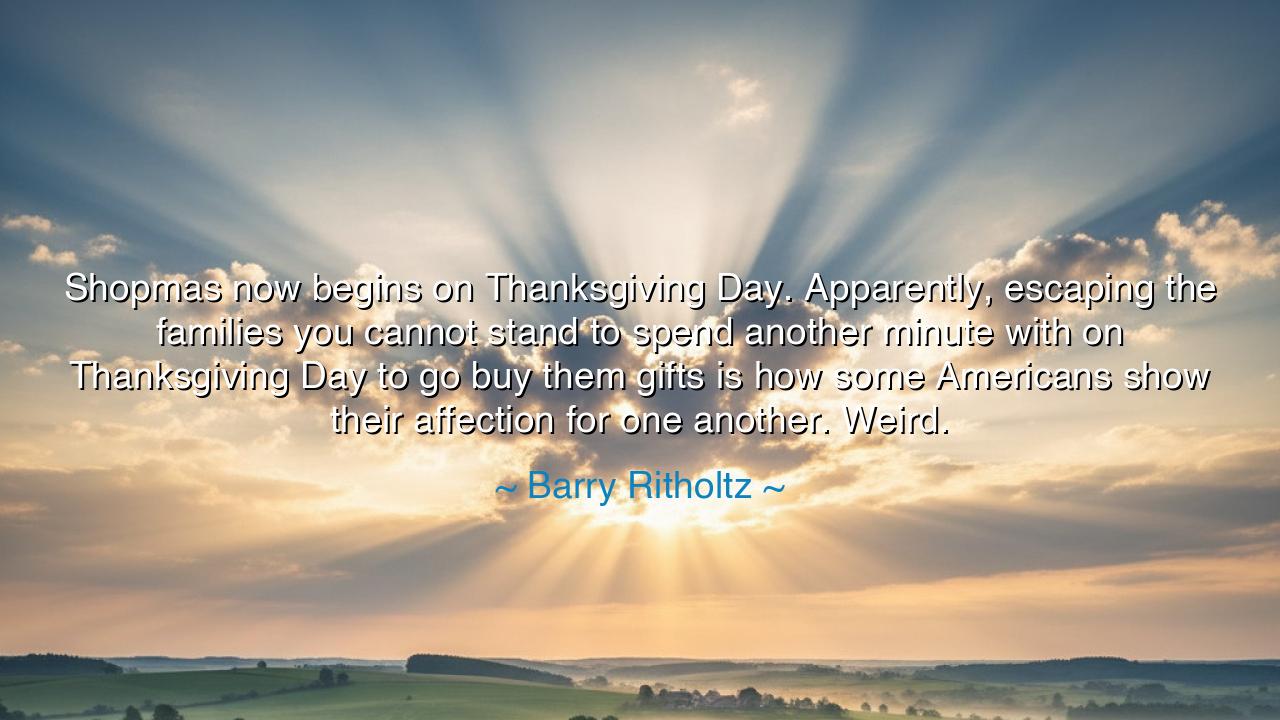
Shopmas now begins on Thanksgiving Day. Apparently, escaping the
Shopmas now begins on Thanksgiving Day. Apparently, escaping the families you cannot stand to spend another minute with on Thanksgiving Day to go buy them gifts is how some Americans show their affection for one another. Weird.






Barry Ritholtz spoke with both wit and lament when he said: “Shopmas now begins on Thanksgiving Day. Apparently, escaping the families you cannot stand to spend another minute with on Thanksgiving Day to go buy them gifts is how some Americans show their affection for one another. Weird.” In these words lies a mirror held to the modern age, a reflection of how the sacred has been traded for the shallow, and how the marketplace has invaded the hearth. It is not only a critique of commerce but a call to awaken the soul to what is real and lasting.
The origin of this saying rests in the recent history of consumer culture. Once, Thanksgiving was a day set aside for gratitude, for gathering at the family table, for offering thanks to God and to one another. But as the years turned, retailers, hungry for profit, extended their Christmas shopping season earlier and earlier, until the day of thanks became the opening act for Shopmas, the festival of consumption. Ritholtz, a financial writer with sharp eyes for cultural irony, pointed out the absurdity: people fleeing from the warmth of family, only to stand in cold lines under neon lights, grasping at bargains in the name of love.
The contrast is ancient and striking. In the old world, holy days were set apart from commerce; on the Sabbath, the markets closed, and people turned their hearts to prayer and rest. In Rome, feast days were times of games and offerings to the gods, not of buying and selling. To turn a day of thanksgiving into a frenzy of shopping is to rob it of its soul, leaving only the husk of ritual. The act of giving gifts was once sacred, a symbol of affection and thoughtfulness. Now it risks becoming hollow, a mere transaction of goods divorced from true love.
History warns us of this path. Consider the fall of Rome, when bread and circuses replaced discipline and reverence. The people were distracted by spectacle and consumption, forgetting duty and gratitude, until the empire itself crumbled. Likewise, if a nation forgets to give thanks, if it prefers malls to tables and sales to prayers, its spiritual foundation grows weak. Ritholtz’s sharp jest is a prophecy: a society that flees its families for bargains risks losing both family and soul.
Yet within the jest lies hope. For not all is lost. Even now, families gather, meals are shared, prayers are spoken, laughter rings out, and memories are made. To resist Shopmas is possible, if one chooses presence over purchase, fellowship over frenzy. The true gift we can give to one another is time, attention, and love. These cannot be bought at discount nor wrapped in shiny paper, but they endure long after the trinkets of a sale are forgotten.
The lesson, therefore, is this: remember what Thanksgiving is for. Do not let the call of the marketplace drown the quiet voice of gratitude. If you would give gifts, let them be thoughtful, not hurried. If you would show love, do it not through objects alone, but through presence. For the child who remembers your embrace, the spouse who recalls your listening ear, the parent who cherishes your gratitude—these are treasures beyond price.
So, O listener, mark this wisdom and act upon it. When the world beckons you to the mall on Thanksgiving night, pause. Stay a little longer at the table. Share another story, wash the dishes together, linger by the fire. Choose memory over merchandise, spirit over sale. For in the end, no one will remember the bargain you fought for in the cold, but they will remember the love you gave when you chose to stay. Thus, reject the hollow call of Shopmas, and keep Thanksgiving holy with gratitude, fellowship, and love.






AAdministratorAdministrator
Welcome, honored guests. Please leave a comment, we will respond soon